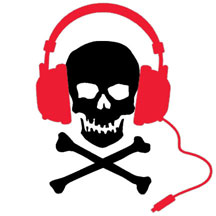
Guest Post: Pirating Video Content Is Sleezy, Not a Badge of Honour
[It’s cold, so we’re staying inside. Besides, with the Golden Globes and the Academy Awards coming up, there’s so much video that we need to catch up on. This guest post from Andy points out that no one should be pirating this stuff. -AC]

 “The world is a dangerous place, Elliott, not because of those who do evil, but because of those who look on and do nothing.” – Mr. Robot, “Anonymous Content” (2015)
“The world is a dangerous place, Elliott, not because of those who do evil, but because of those who look on and do nothing.” – Mr. Robot, “Anonymous Content” (2015)
I’m not a big fan of shopping at Costco – one of the buy-in-bulk stores in the U.S. – because:
-We don’t have anywhere to store that much toilet paper–you buy in 50 lb. lots
– I’m not into eating my lunch while shopping from all of the “free sample” stations around the warehouse
But on a recent trip, I noticed an empty Pepsi bottle tucked back in one of the racks; and all I could think was “really?”
The store had water fountains everywhere and a snack bar where you can buy almost anything you want to eat/drink and yes, they sold Pepsi.
Did it really taste better because the individual stole from Costco?
Later, I read an online report from ABI Research that video piracy cost the M&E (media & entertainment) industry an estimated $10B last year.
Don’t know about you; but to me, that’s serious money.
The RIAA (Recording Industry Association of America) has been fighting piracy ever since content went digital.
A few years ago (may still be), they went a little overboard by dragging people they identified as pirates into court, suing the kid and his innocent bystander parents with ruthless abandon.
They were within their rights, but it was really dumb.
Which side is public opinion going to take – a faceless, mindless, heartless association or some dumb*** kid and his parents who were struggling to make house payments and put food on the table?
Right!
It won’t be long and AMPAS (Academy of Motion Picture Arts and Sciences) will be hosting the Academy Awards with a lavish, expensive production that will run way too long, be filled with glowing/boring speeches and surprise almost no one.
Academy members will have voted/selected the winners, but the real measure of a film’s success will be how many copies were stolen, streamed and viewed by folks.

That’s a pretty sick way of measuring interest and popularity.
The total is probably much higher because studios seem to have a squirrelly way of accounting for expenses, profits, losses but still…
And it’s not just movies.

Once Reid and company became successful – and a pain in the TV establishment’s backside – Netflix SVOD (subscription video on demand) and others jumped on board with their streaming services and it’s gotten more pervasive.
Yes, we brought it on ourselves.
Technologists developed the free Internet and made it available to everyone with a connectable device.
Companies rushed to put up free content, stuff and folks liked free.
Paywalls went up and organizations started to monetize the video content with subscriptions, pay-for-view and ad support.
Millions of people around the globe liked having access to brilliant new video content and they signed up with Netflix, Amazon Prime, Hulu and others.
That attracted more content owners and distributors into the pool to get their share of the money or to survive as the industry shifted from traditional day/time TV to anytime, anywhere viewing.
It’s sorta’, kinda’ working because Cisco reported that 80 percent of the Internet traffic is video; while Ericsson forecast that video will make up 75 percent of the mobile traffic – 14TB/month this year up to 110EB/month in 2023.
Of course, your mobile service provider is already rubbing their collective hands together cooking up new ways to charge you for using their bandwidth while telling you you’re getting free data service.
But that’s just a different creative accounting issue.
All of that luscious OTT (over the top) content is tempting to entrepreneurs who see a way to make a quick buck or two and people who like to drink a Pepsi in the middle of the store because it tastes better when you steal it.
In almost every corner of the globe, you can purchase legitimate set-top boxes that let you illegally stream movies, TV shows and sporting events.
The producers, sellers and some government officials say the boxes are legal for streaming stuff like YouTube, Facebook Watch and similar services–even though people tend to gravitate to streaming pirated content.
Government agencies everywhere seem to take a laissez faire approach to this content theft.
For example, the IPO (Intellectual Property Office) of Singapore explained, “Copyright infringement is not so much about a device or technology as it is about whether that device or technology is used in a manner that is illegal. Users of such devices should therefore ensure that they are accessing content from authorized content providers.”

The boxes are one thing, but IMO the worst offenders (enablers) are Torrent sites around the web that specialize in pirated video for one and all.
They’re probably impossible for governments to “shut down” because creative folks can move the content from servers in one country to another; sorta’ like trying to squish a blob of mercury.
Of course, studios and networks have come up with all types of protection devices – DMA (digital rights management), encryption, end-to-end protection, you name it.
The only thing those perfect protection tools seem to do is give the pirate a new challenge to master … and they do.
My approach seems a whole lot simpler.
Every site, computer and server would have an IP (Internet protocol) address that is unique to that device, any online device.
If every search engine/social media service – Google, MS, Facebook, Mozilla, and others around the globe – simply said their algorithms didn’t understand those search requests, the sites would simply gather dust.
After all, “everyone” knows if you can’t find it on the Internet, it really doesn’t exist!
Why care? After all:
-Piracy only hurts big business
-Authors already have plenty of money
-Digital content is too expensive
-Everyone else is doing it
-We live in a different country and don’t get the movies/shows until months later
 Or, a simple Google search gives you a ton of rationalizations.
Or, a simple Google search gives you a ton of rationalizations.
In other words, it’s a victimless crime.
But it isn’t!
The studio system was dismantled years ago.
Instead of a staff of shooters, audio folks, boom people, runners, Eps, DPs, you name it; they have a core group of money people/managers.
The real creative work is done by independent specialists – 10s of thousands of men/women sorta’ like you – except that they want to tell video/audio stories.
I was reminded of the fact when I visited the history-rich studio, Raleigh Studios, during the annual DCS (Digital Cinema Society) Post Expo.
The 100-year-old facility is in the heart of Hollywood and has been the home of film industry icons like Charlie Chaplin, Douglas Fairbanks, Mary Pickford and 100s more, including some of TV shows you see today.
What really caught my eye though was an old Tecart Studios poster


More importantly, note the text box in the lower left.

 In other words, exciting, creative, video stories have been done by Indies and 80-plus percent of it still comes from them today.
In other words, exciting, creative, video stories have been done by Indies and 80-plus percent of it still comes from them today.
That’s the people pirates steal from.
Not some monolith that cranks out bottle after bottle of sugared water.

As Mobley said, “When it gets down to it, everyone’s the same. They love something. They want something. They fear something. Specifics help, but specifics don’t change the way that everyone is vulnerable. It just changes the way that we access those vulnerabilities.”



Problem is that streaming services can’t show content outside of the country it can be shown. If the viewer/user/subscriber were to purchase everything that is not available in their country. The total cost plus the cost of subscribing each month would be more than most people can afford. Most people are paying well over $50 for their phone service and internet another $50 if not more, plus the cost of netflix or hulu or amazon prime or both… it’s not affordable as that’s just for communication and entertainment.
People pirate because there’s no video store to rent from anymore, there’s no DVD’s to borrow anymore.. there’s a selection online going back a hundred years from just about any country on earth and people can’t purchase every title from YouTube or Itunes… after all the bills each month how can someone budget for all the media they watch that is available for a price for each title?
The fact that it hurts content creators, their teams and their casts who have no vested interest in scamming people is not good. If there was a way for the laws to change there would be significantly less piracy from honest people if streaming services could show what is available in another country. 8 out of 10 times I search Netflix in Canada I see a list of related titles. Why am I paying for this if not for the original content?
Why do you think people pirate who pay to subscribe?